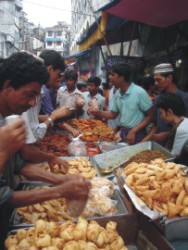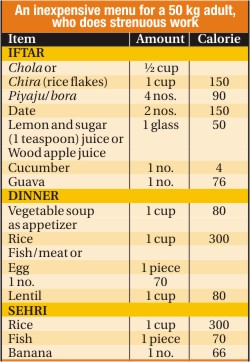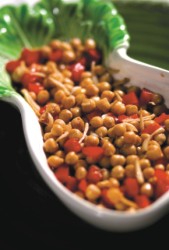Health
Ensuring a Healthy Fast
Tamanna Khan
 As dusk approaches the clamour in the kitchens increases, the honks at the roads die out, and even the most substandard food on temporary roadside stalls quickly disappear; and fasting Muslims, ready to fill in their day's deficiency, gather around the special meal called Iftar. After hours of abstinence from food, most people suffer from the misconception that they need to devour as much as they can throughout Iftar (break fasting meal) to Sehri, the late night meal that marks the beginning of the fast. However, in doing so, people not only lose the true meaning of Ramadan but also bring bad news for their health. As dusk approaches the clamour in the kitchens increases, the honks at the roads die out, and even the most substandard food on temporary roadside stalls quickly disappear; and fasting Muslims, ready to fill in their day's deficiency, gather around the special meal called Iftar. After hours of abstinence from food, most people suffer from the misconception that they need to devour as much as they can throughout Iftar (break fasting meal) to Sehri, the late night meal that marks the beginning of the fast. However, in doing so, people not only lose the true meaning of Ramadan but also bring bad news for their health.
Islam instructs during the month of Ramadan, all adult Muslims to practice self-restraint through fasting from the first light of the day to dusk. Fasting not only means abstaining from food but also controlling the palate, being patient and above all staying away from wrong deeds. Unfortunately, in our country, for the well-to-do Muslims, Ramadan almost always brings with it over-indulgence, be it in the form of over-eating or cramming the marketplaces with their shopping frenzy. Thus wherein through fast we are suppose to carry out a yearly cleansing of the soul and the metabolic system, by giving it a little rest, most of us end up doing just the opposite. Our food habit intensifies the problem, because Bangladeshi Muslims cannot think of Iftar without fried, spicy dishes in the menu. Halima Khatun, Assistant Professor and Head of department of Home Economics, Abu Dharr Giffery College, says “Intake of fried items could have been healthy, had it been cooked in unsaturated oil that is vegetable oil.” The bad news is, in most of the road side stalls, the mouth-watering bora (spicy fried balls of lentil), beguni (fried sliced eggplants coated in chickpea flour) and jilepi (fried sweet made with flour) is cooked in adulterated oil; even at many homes where soya-bean oil is used, people have the tendency of frying food in oil that has already been used previously. “It is alright to some extent if a teaspoon of the oil that has once been used to fry food, is applied in cooking, the next day, in a wholesome meal for example to chicken, but using the same oil for frying is disastrous as the oil is already burned, ” adds Halima. Studies carried out in United Kingdom, United States and Spain show that soya, canola, sunflower, and corn oil degrade easily to toxic compounds when heated. Frying the same oil over and over again only ensures the creation of toxins masked beneath the dazzle of delicacy. Although fat is one of the six basic nutrients required by our body the percentage we need to intake from food is very less. Only a teaspoon of unsaturated fat is needed by the body and provides the essential fatty acid that regulates our bodily function and helps carry the fat-soluble vitamins.
 The essential amount of the six basic nutrients namely carbohydrates, proteins, fats, vitamins, minerals and water, does not change while fasting. Halima Khatun explains that whilst food refers to anything we like to eat, nutrients are foods that produce the energy we spend (measured in calories) to carry out our daily activities. “For an adult who does strenuous work, each kilo of their body weight needs 35-38 calories and for those who do not work at all 20 calories is enough,” says Halima. Thus an adult weighing 60 kg must ensure a minimum of 1200 calories intake through his/ her food, which is spent by the body for doing work, for burning food, and for Basal Metabolic Rate (BMR is the energy expended while at rest for ensuring functioning of vital organs). Normally, through our meals set at various times of the day we do intake more than 1200 calories and the same is possible during Ramadan. We just need to keep an eye on our Iftar, dinner and Sehri menus and make sure all the six nutrients required by the body are present in the correct proportion. Interestingly, the dishes at Iftar and Sehri do not necessarily have to be dull or medicinal. We can stick to our traditional dishes and still maintain a balanced diet rich in all the six nutrients. “Islam has already provided us with the guideline for food. A daylong fast, especially in summer, makes the brain waterless. Thus when we break the fast with lemon juice made of sugar and water, the sugar directly goes to the blood and then the date, a major source of carbohydrate, provides the brain with the necessary energy,” says Halima. Muri (puffed rice) that forms the main dish of most Iftar, is a good source of carbohydrate; protein is provided by chola (kabuli gram) and bora, and the oil used in preparing these items provide more than the necessary fat. Halima emphasises that there should be a good number of juicy fruits at Iftar to keep the diet rich in vitamins. Our body has no storage for vitamins and minerals so all our meals must contain a good proportion of these nutrients. The essential amount of the six basic nutrients namely carbohydrates, proteins, fats, vitamins, minerals and water, does not change while fasting. Halima Khatun explains that whilst food refers to anything we like to eat, nutrients are foods that produce the energy we spend (measured in calories) to carry out our daily activities. “For an adult who does strenuous work, each kilo of their body weight needs 35-38 calories and for those who do not work at all 20 calories is enough,” says Halima. Thus an adult weighing 60 kg must ensure a minimum of 1200 calories intake through his/ her food, which is spent by the body for doing work, for burning food, and for Basal Metabolic Rate (BMR is the energy expended while at rest for ensuring functioning of vital organs). Normally, through our meals set at various times of the day we do intake more than 1200 calories and the same is possible during Ramadan. We just need to keep an eye on our Iftar, dinner and Sehri menus and make sure all the six nutrients required by the body are present in the correct proportion. Interestingly, the dishes at Iftar and Sehri do not necessarily have to be dull or medicinal. We can stick to our traditional dishes and still maintain a balanced diet rich in all the six nutrients. “Islam has already provided us with the guideline for food. A daylong fast, especially in summer, makes the brain waterless. Thus when we break the fast with lemon juice made of sugar and water, the sugar directly goes to the blood and then the date, a major source of carbohydrate, provides the brain with the necessary energy,” says Halima. Muri (puffed rice) that forms the main dish of most Iftar, is a good source of carbohydrate; protein is provided by chola (kabuli gram) and bora, and the oil used in preparing these items provide more than the necessary fat. Halima emphasises that there should be a good number of juicy fruits at Iftar to keep the diet rich in vitamins. Our body has no storage for vitamins and minerals so all our meals must contain a good proportion of these nutrients.
 |
| Photo: Sazzad Ibne Sayed |
In hot and humid weather like ours, dehydration is a major problem and it becomes a major health hazard during Ramadan, because during the short interval of fast breaking we do not consume enough water. “It is often not possible to drink the required three to four litres of water, right after breaking the fast, but we should try to consume as much liquids as possible in the form of vegetable soups, juice, juicy fruits, curd, milk, even tea or coffee,” advises Halima. We should also remember that since our digestive system remains at rest all day we should not torture the body with lots of spicy food which is hard to digest. In addition, the interval between the meals become short during Ramadan, having Iftar in the evening, dinner at early hours of night and again Sehri only after five hours or so, does not give the body enough time to do its work. Thus by eating less we need to habituate our body to the sudden change. She reminds that the Islamic way of saying prayers right after having the lemon juice and date, gives the body time to adjust to the change. The Tarabi prayers also contribute in digestion of the food before the early night dinner and light walking before going to sleep is also advisable. For Sehri the food should be light but must contain all the six categories of nutrients. “Hard to digest food like meat should be avoided for Sehri,” advises Halima, “rather it should be kept for dinner. A small amount of rice, vegetable and fish or the Bengali favourite doodh-kola (milk and banana) makes a good meal for Sehri.” As a concluding note Halima says that it is always advisable to consume in such a manner that there is some room left in your stomach for another serving.
Copyright
(R) thedailystar.net 2010
|

